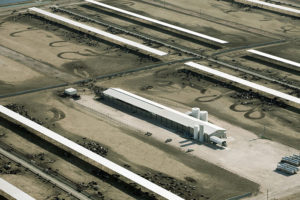Please feel free to quote anything in this statement to balance a story you might be already working on. You are also welcome to run this in its entirety as an op-ed. Photo of Mr. Kastel available upon request.
Organic Get Out Of Jail Free Card —
USDA exonerates largest “organic” factory dairy
To the organic community,
The Cornucopia Institute received a determination letter yesterday, September 27, from the USDA dismissing our most recent formal legal complaint against Aurora Dairy’s High Meadows facility in Colorado.
In an unprecedented move the government’s comprehensive explanation of why they dismissed the complaint would appear to be “damage control” for an agency under siege. After a scathing series of investigative reports published in The Washington Post, outlining gross improprieties in “organic” factory livestock production and massive fraud in the importation of organic commodities, and a damning audit of the National Organic Program’s work by the USDA’s Office Of Inspector General, the NOP’s longtime director, Miles McEvoy, recently announced his retirement effective tomorrow, September 30.
The USDA’s comprehensive letter closing the complaint, describing how Aurora is complying with the law, is  virtually unprecedented. In past cases, the department merely stated that they had closed investigations, finding the allegations to be unsubstantiated. Their extra effort here, besides for serving as a buffer for criticism against the NOP, is a generous gift for Aurora Dairy.
virtually unprecedented. In past cases, the department merely stated that they had closed investigations, finding the allegations to be unsubstantiated. Their extra effort here, besides for serving as a buffer for criticism against the NOP, is a generous gift for Aurora Dairy.
Aurora is the nation’s largest certified organic milk producer. Utilizing a series of corporate-owned dairies, milking thousands of cows each in Texas and Colorado, Aurora produces private-label milk for Walmart, Target, Costco, and a myriad of major grocery chains and distributors.

When Cornucopia filed a series of complaints against nearly a dozen “organic” CAFOs in late 2014 (also covered in an exclusive story in The Washington Post) based on aerial photography and state regulatory documents, the NOP dismissed the allegations, stating the photographs revealed just “a moment in time.”
Our response was that, yes, they were randomly chosen moments at numerous industrial-scale facilities (depicting zero chickens outdoors and no dairy with more than 10% of their cattle out on pasture, many in conditions that were not conducive to grazing). But a “moment in time” should not invalidate evidence of flagrant violations of the law. After all, annual inspections conducted by certifiers who are compensated by their clients, and that the USDA depends on also illustrate only “a moment in time.” The only difference is that the inspections are by prearranged appointment.
With enhanced resources, The Washington Post observed the Aurora facility managing over 20,000 cows (milking about 15,000) for over a week and included drone imagery —not a single moment in time. However, the NOP dismissed the findings based on this expanded surveillance as well.
Aurora has noted that the USDA organic standards are “scale-neutral.” And, indeed, they are. However, if vigorously enforced, which has not been the historical posture by the USDA, the federal organic regulations would be “scale-limiting.” Although there are examples of excellently managed organic dairies milking over 500 cows, ten times the scale of many organic farms, to suggest that you can operate CAFOs (concentrated animal feeding operations) with 5,000, 10,000, or even 20,000 or more cows, with stocking densities as high as ten cows per acre, stretches even the most liberal definition of organic livestock management beyond credulity. Most organic dairy farms milk 50-100 cows, and past research has indicated an average stocking density of approximately one cow per acre.
Cornucopia will be filing, later today (September 28), a document request under the Freedom of Information Act to determine whether the NOP investigation was based on a surprise visit or prearranged appointment (their pattern in the past). And it will ascertain what personnel were involved, including their professional backgrounds qualifying them to make their final determination in our complaint.
Even if their visit was unannounced, Aurora was, based on The Washington Post’s evidence, violating the law. The intense media focus and pending formal legal complaint by Cornucopia could, logically, have spooked Aurora management and resulted in cattle being out on grass during the visit by USDA staff, appearing to conform to the law. Just because an armed bank robber returns the cash to the bank does not exonerate them from their past crimes.
Aurora is the same company that USDA investigators found, a decade ago, in “willful” violation of 14 tenets of the organic standards. They received no fine at that time in a sweetheart, negotiated settlement with political appointees at the USDA (career civil servants had recommended Aurora be banned from organic commerce). Subsequent investigations of their Colorado and Texas operations indicated they have continued to flout the spirit and letter of the organic law. But, obviously, federal regulators believe Aurora, and other large members of the industry lobby group Organic Trade Association, are “too big to fail.”
The lack of justice in the Aurora matter comes at a time of a national surplus in the wholesale organic milk market. Ethical, family-scale farmers and their marketing partners are currently suffering severe financial stress. Most organic dairy producers are enduring substantial cuts to their pay price and many are being placed on quotas. This has forced some to return to conventional production and others to exit dairying altogether, or contemplate doing so. Much of the surplus milk can be traced to Aurora and other factory-farm dairy operations.
With a major update expected to be released later this year, The Cornucopia Institute’s organic dairy brand scorecard offers consumers and wholesale buyers the opportunity to “take the law into their own hands.” Since its initial publication, buyers of organic dairy products have shifted millions of dollars’ worth of market share from alleged scofflaw factory farm operators like Aurora Dairy to the brands that support farmers who practice the true foundational principles of organics: sound environmental stewardship, humane animal husbandry, and economic justice for the people who produce our food.
Sincerely yours,
Mark A. Kastel
Codirector and Senior Farm Policy Analyst
The Cornucopia Institute
[email protected]
608-625-2000
P.S. Research has been underway evaluating the filing of a civil lawsuit(s) against Aurora. The last time the USDA let Aurora off the hook, even after their investigators found numerous violations of the law, the company faced civil lawsuits and ended up settling for approximately $8 million. In addition to still photography, satellite images, and drone videos, testing revealed the nutritional components in Aurora’s milk were similar to conventional brands, not milk produced by cows grazing on pasture, as required in organic production. The USDA might be willing to ignore this evidence, but we doubt that organic stakeholders, or the courts, will let them off so easily.

